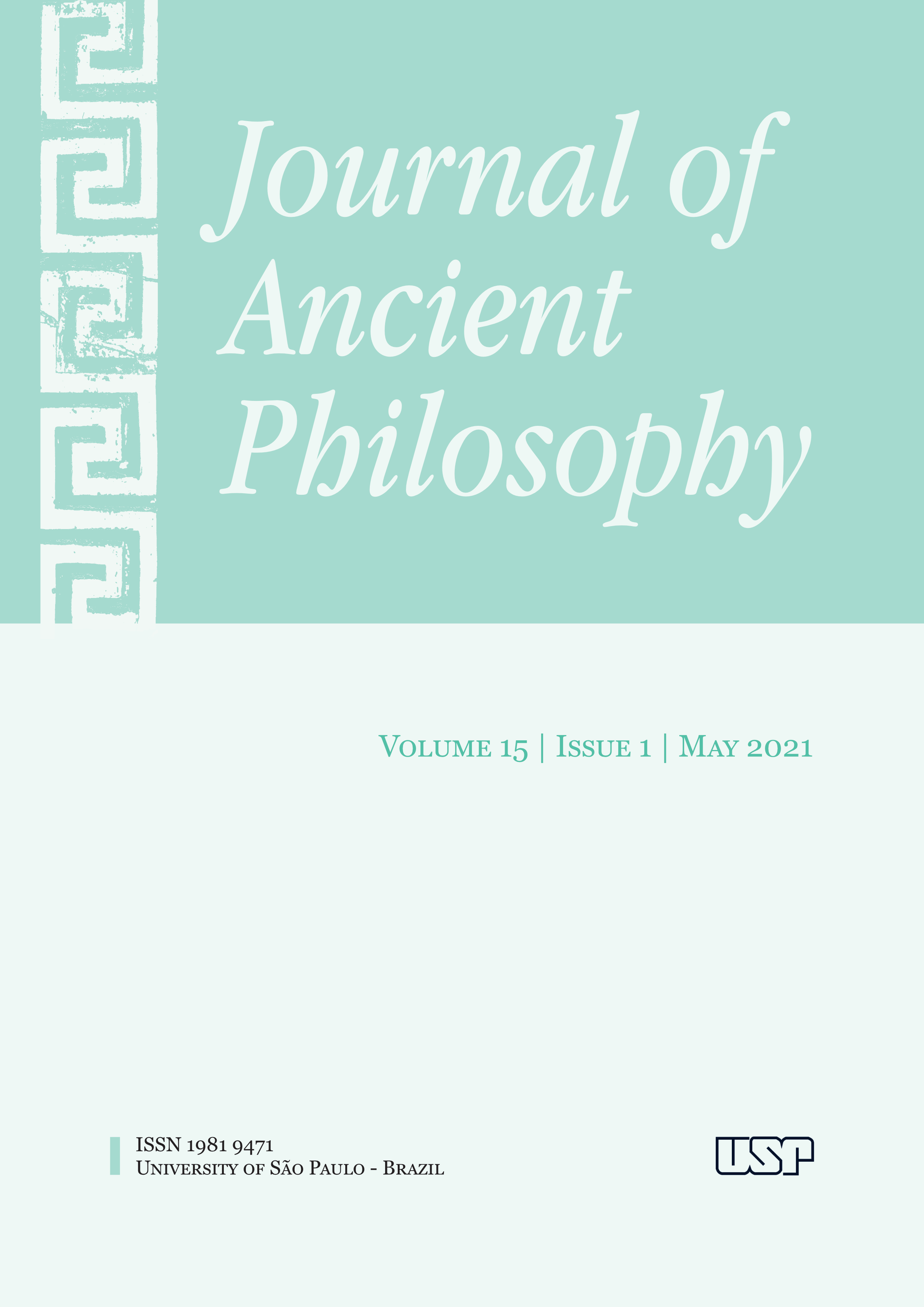Aristóteles e a Lógica da Contingência: uma interpretação tradicional do argumento da batalha naval
DOI:
https://doi.org/10.11606/issn.1981-9471.v15i1p64-143Palavras-chave:
De interpretatione, batalha naval, bivalênciaResumo
Since Antiquity, the meaning and purpose of Aristotle’s sea-battle argument have been highly controversial. On the so-called traditional interpretation of De Interpretatione 9, the argument is intended to prove that not every statement is always true or false on the assumption deemed evident that facts may occur contingently in our sublunar world. In this paper I argue that this interpretation is for many reasons much more plausible than any of its competitors, so that its correctness is worthy at least of moral certainty. In particular, I contend that it can coexist in perfect logical harmony with a moderately charitable reading of Aristotle’s texts that at first glance it seems to confute. As a matter of fact, I contend that it is faithful to Aristotle’s view of logical laws as consequent upon the metaphysical structure of reality.
Downloads
Referências
Al-Farabi 1981, Al-Farabi’s Commentary and Short Treatise on Aristotle’s De Interpretatione, London.
Ammonius 1897, In Aristotelis De Interpretatione commentarius, A. Busse (ed.), Berlin.
Ammonius 1998, On Aristotle: On Interpretation 9, David Blank (trans.), with Boethius, On Aristotle: On Interpretation 9, Norman Kretzmann (trans.), London and Ithaca.
Anscombe, G.E.M. 1956, “Aristotle and the sea battle”, Mind 65 (257), 1-15.
Aquinas Thomas 1882, Commentaria in Aristotelis libros Peri hermeneias et Posteriorum analyticorum, Editio Leonina, vol. I, Romae.
Boethius 1877/1880, Commentarii in librum Aristotelis Peri Hermeneias, C. Meiser (ed.), Leipzig.
Broadie, Sarah 1986, “On What Would Have Happened Otherwise: A Problem for Determinism”, The Review of Metaphysics 39, 433-56.
Broadie, Sarah 1987, “Necessity and Deliberation: an Argument from De Interpretatione 9”, Canadian Journal of Philosophy 17, 289-306.
Fine, Gail 1984, “Truth and Necessity in De Interpretatione 9”, History of Philosophy Quarterly 1 (1), 23-47.
Gaskin, Richard 1995, The Sea-Battle and the Master Argument: Aristotle and Diodorus Cronus on the Metaphysics of the Future, Berlin.
Judson, Lindsay 1988, “La Bataille navale d’aujourd’hui: De Interpretatione 9”, Revue de Philosophie Ancienne 6, 5-37.
Kretzmann, Norman 1998, “Boethius and the truth about tomorrow’s sea battle”, in Ammonius 1998, 24-52.
Lowe, Malcom F. 1980, "Aristotle on the sea-battle: a clarification", Analysis 40 (1), 55-59.
Lukasiewicz, Jan 1970, Selected Works, L. Borkowski (ed.), Amsterdam and Warszawa.
Mignucci, Mario 1998, “Ammonius’ sea battle” in Ammonius 1998, 53–86
Rescher, Nicholas 1963, “An interpretation of Aristotle’s doctrine of future contingency and excluded middle”, in Rescher, Nicholas 1963, Studies in the History of Arabic Logic, Pittsburgh, 43-54.
Seel, Gerhard (ed.) 2000a, Ammonius and the Sea Battle. Texts, Commentary and Essays, Berlin and New York.
Seel, Gerhard 2000b, “‘In a Definite Way True’; Truth-Values and their Modalization in Ammonius”, in Seel 2000a, 234–246.
Sharples, Robert 1992, Alexander of Aphrodisias: Quaestiones 1.1–2.15, London and Ithaca.
Simplicius 2000, Simplicius: on Aristotle’s Categories 9-15, London.
Spellman, Lynne 1980, “DI 9: an exegetical stalemate”, Apeiron 14 (2), 115-124.
Strang, Colin 1960, "Aristotle and the sea battle", Mind 69 (276), 447-465.
Downloads
Publicado
Edição
Seção
Licença

Este trabalho está licenciado sob uma licença Creative Commons Attribution 4.0 International License.
Autores que publicam nesta revista concordam com os seguintes termos:- Autores mantém os direitos autorais e concedem à revista o direito de primeira publicação, com o trabalho simultaneamente licenciado sob a Licença Creative Commons Attribution (CC 4.0) que permite o compartilhamento do trabalho com reconhecimento da autoria e publicação inicial nesta revista.
- Autores têm autorização para assumir contratos adicionais separadamente, para distribuição não-exclusiva da versão do trabalho publicada nesta revista (ex.: publicar em repositório institucional ou como capítulo de livro), com reconhecimento de autoria e publicação inicial nesta revista.
- Autores têm permissão e são estimulados a publicar e distribuir seu trabalho online (ex.: em repositórios institucionais ou na sua página pessoal) a qualquer ponto antes ou durante o processo editorial, já que isso pode gerar alterações produtivas, bem como aumentar o impacto e a citação do trabalho publicado (Veja O Efeito do Acesso Livre).


